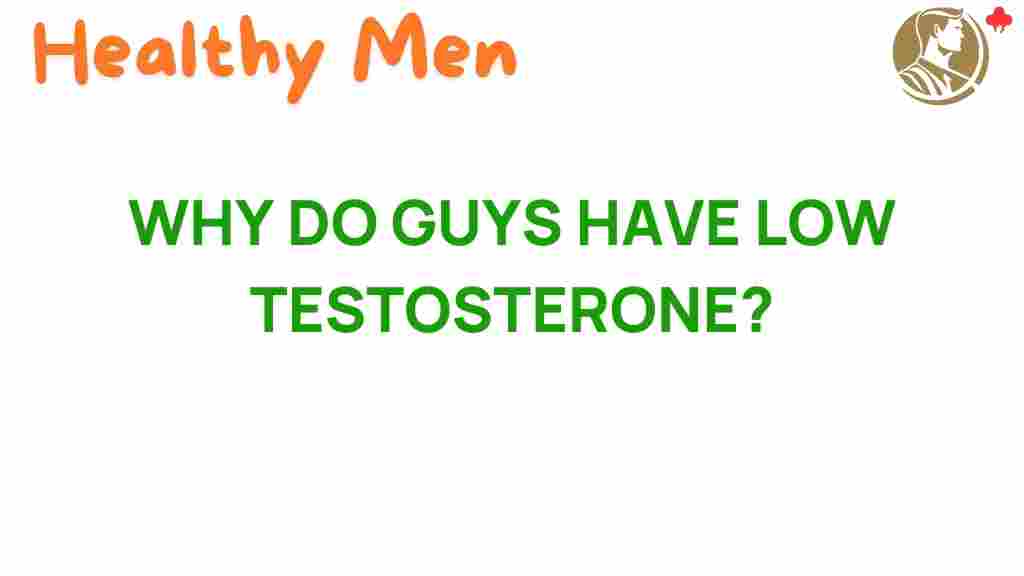Unraveling the Mystery: Why Do Men Experience Low Testosterone?
Testosterone is a vital hormone that plays a significant role in men’s health, influencing everything from muscle mass and bone density to mood and libido. However, many men experience low testosterone levels as they age or due to various lifestyle factors. In this article, we will explore the reasons behind low testosterone, its symptoms, the age-related decline, potential treatment options, and lifestyle adjustments that can help improve testosterone levels. We will also emphasize the importance of seeking medical advice for proper diagnosis and treatment.
Understanding Testosterone and Low Testosterone
Testosterone is produced primarily in the testicles and is responsible for many male characteristics. Low testosterone, also known as hypogonadism, occurs when the body does not produce enough testosterone. This condition can arise from various factors, including hormonal imbalance, age-related decline, and underlying health conditions.
Symptoms of Low Testosterone
Recognizing the symptoms of low testosterone is crucial for early diagnosis and treatment. Some common symptoms include:
- Fatigue and decreased energy levels
- Reduced libido or sexual dysfunction
- Loss of muscle mass and strength
- Increased body fat
- Depression or mood swings
- Difficulty concentrating and memory issues
- Sleep disturbances
If you experience any of these symptoms, it’s essential to consult with a healthcare professional.
Age-Related Decline in Testosterone
As men age, testosterone levels typically decline. This natural decline begins around the age of 30 and continues at a rate of about 1% per year. While this decrease is normal, some men may experience a more significant drop that leads to low testosterone levels. Understanding the age-related decline can help men prepare for and mitigate the effects of low testosterone.
Factors Contributing to Low Testosterone
Several factors can contribute to low testosterone levels in men, including:
- Hormonal Imbalance: Issues with the hypothalamus or pituitary gland can disrupt hormone production.
- Obesity: Excess body fat, especially around the abdomen, can lead to lower testosterone levels.
- Chronic Illness: Conditions like diabetes, hypertension, and metabolic syndrome can affect testosterone production.
- Medications: Certain medications, including opioids and steroids, can impact hormone levels.
- Stress: Chronic stress can lead to elevated cortisol levels, which can inhibit testosterone production.
- Alcohol and Substance Abuse: Excessive alcohol consumption and drug use can negatively affect hormone levels.
Diagnosing Low Testosterone: Medical Advice
If you suspect you have low testosterone, seeking medical advice is the first step. A healthcare provider will typically conduct a physical exam and order blood tests to measure your testosterone levels. The tests are usually done in the morning when testosterone levels are highest. If your testosterone is low, your doctor may also check for other hormonal imbalances.
Treatment Options for Low Testosterone
There are several treatment options available for men with low testosterone. Each option has its benefits and considerations, so it’s essential to discuss them with a healthcare provider.
1. Testosterone Replacement Therapy (TRT)
TRT is a common treatment for low testosterone and can be administered through:
- Injections: Administered by a healthcare professional or self-injected.
- Patches: Applied to the skin daily.
- Gels: Applied to the skin, allowing testosterone to absorb into the bloodstream.
- Pellets: Implanted under the skin, releasing testosterone over several months.
While TRT can effectively raise testosterone levels and alleviate symptoms, it may also come with side effects, such as increased risk of heart disease or prostate issues. Regular monitoring and consultations with a healthcare provider are essential.
2. Lifestyle Changes
In addition to medical treatments, lifestyle changes can significantly impact testosterone levels. Consider the following:
- Exercise: Engage in regular physical activity, focusing on strength training and high-intensity interval training (HIIT).
- Nutrition: Eat a balanced diet rich in healthy fats, proteins, and carbohydrates. Foods like lean meats, nuts, and leafy greens can support hormonal balance.
- Weight Management: Achieving a healthy weight can help increase testosterone levels, especially in overweight individuals.
- Sleep: Prioritize good sleep hygiene; aim for 7-9 hours of quality sleep per night.
- Stress Reduction: Practice stress management techniques such as meditation, yoga, or deep-breathing exercises.
3. Alternative Treatments
Some men explore alternative treatments to boost testosterone levels. While the efficacy of these methods may vary, they can be worth considering:
- Herbal Supplements: Some herbs, like fenugreek and ashwagandha, may have a positive impact on testosterone levels.
- Vitamins and Minerals: Ensuring adequate levels of Vitamin D and zinc can support hormone production.
Always consult a healthcare provider before starting any new supplement regimen.
Troubleshooting Low Testosterone: Common Questions
Can Low Testosterone Affect Mental Health?
Yes, low testosterone can lead to symptoms of depression, anxiety, and irritability. Addressing low testosterone can help improve mental health and overall quality of life.
Is Low Testosterone Reversible?
In some cases, low testosterone can be reversible, especially if the underlying cause is identified and treated. Lifestyle changes and medical interventions can help restore hormone levels.
How Can I Maintain Healthy Testosterone Levels as I Age?
Maintaining a healthy lifestyle is crucial. Focus on regular exercise, balanced nutrition, weight management, and stress reduction techniques. Regular check-ups with your healthcare provider can also help monitor hormone levels.
Conclusion
Low testosterone is a common issue that many men face, particularly as they age. Understanding the causes, symptoms, and treatment options available can empower men to take control of their health. Whether through testosterone replacement therapy, lifestyle changes, or alternative treatments, there are ways to manage low testosterone effectively. If you’re experiencing symptoms of low testosterone, seeking medical advice is essential to receive the appropriate diagnosis and treatment tailored to your needs.
For more information on men’s health and testosterone, visit Men’s Health Network.
If you are struggling with low testosterone, consider consulting your healthcare provider to explore your options and find the best path forward.
This article is in the category Conditions and created by healthymen Team
